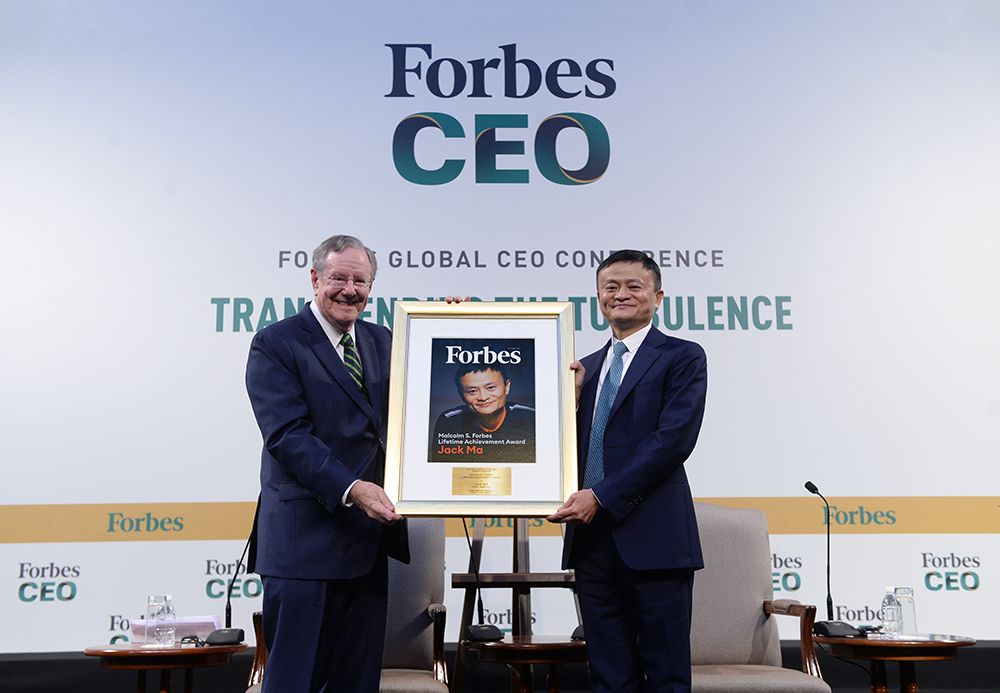
Forbes Media on Wednesday presented the Malcolm S. Forbes Lifetime Achievement Award to Alibaba Group founder and Partner Jack Ma, hailing his commitment to small businesses in addition to the impact that Alibaba has achieved since launching 20 years ago.
The annual award celebrates an individual who embodies and exemplifies the ideals of entrepreneurship championed by Forbes, the company said in a release.
“Jack Ma not only created one of the most outstanding companies of the world but also a company that nourished the vibrant small-business community in China – and small businesses around the globe,” Forbes Media Chairman and Editor-in-Chief Steve Forbes said. “He is indeed one of the most influential figures of our time.”
Ma received the award at the 19th annual Forbes Global CEO Conference, held this year in Singapore, where he and Forbes talked for about an hour about Alibaba history, Ma’s thoughts on entrepreneurship and his philanthropy work. Forbes started by calling Ma “one of the greatest liberators in history, enabling people who wanted to ‚Ķ do commerce. You gave them the means to do it.” Ma explained how that came about.
WATCH: Steve Forbes Interview Jack Ma about Alibaba, entrepreneurship and philanthropy
“We believed in the future and I believe the internet can empower people,” he said, speaking of Alibaba’s 17 other founders in 1999. “So, we do Alibaba because there’s so many small businesses that don’t know when and how, where they can sell the products.”
That led to the launch of B2B e-commerce platform Alibaba.com at first and later other sites, including Taobao, which has grown from a C2C marketplace to become China’s largest mobile-commerce destination. To enable payments on these platforms, Alibaba developed Alipay. The company also wanted to get products from seller to consumer quickly and efficiently, so Ma and his team turned their attention to logistics, eventually launching what is now Cainiao Smart Logistics Network. Alibaba also wanted to support small businesses in need of computing power, so Alibaba Cloud was born. And the company continues to build new businesses to address new demands as the market evolves.
“So, it’s all about solving problems. I think this is what we did in the past 20 years,” Ma said. “We always think about what we can do to solve the social problems instead of complaining. That’s the journey and ‚Ķ millions of people change their lives because [of our] efforts.”
Ma expanded on the company’s mission to help small businesses, young people and women – those largely outside the traditional financial system – via Alipay, the largest mobile payments and lifestyle app in China. Traditional financial companies focus on the top economic levels of society, he said, not the bottom. But Alipay was always a bottom-up operation. While the wealthy elite weren’t willing to test the technology when it was first made available, in 2004, many of China’s less wealthy consumers were.
“They tried it, they loved it, they benefitted from it,” Ma said. “So, this is very, very inclusive.”
“We feel that the financial system for the 21st century should be inclusive, should empower people,” he continued. All “people have the right to reach the money they need.”
Alibaba has found tremendous success during its two decades, as it now serves 730 million annual active consumers in China and another 130 million overseas. Alipay parent Ant Financial, in which Alibaba holds a 33% stake, serves 900 annual active consumers in China and 1.2 billion worldwide, including active users of Alipay’s local e-wallet partners. The $456.4 billion Alibaba currently employs about 100,000 people globally, and its e-commerce platforms reach merchants and consumers in more than 200 countries and regions. This year, Alibaba will host its 11th 11.11 Global Shopping Festival, which has grown into the largest one-day shopping festival in the world.
Ma said he would build on that success – and the money he’s made from Alibaba – to continue helping others. He has already worked through his namesake philanthropic organization, the Jack Ma Foundation, to help improve education and conservation efforts in China. But he has turned his attention to points outside of China as well. Most recently, Ma has focused his attention on supporting entrepreneurs in Africa. He has said that entrepreneurs are “the most important element to develop a society,” and therefore they will be central to Africa’s economic development in the decades ahead.
“I have the money, I have the resources and I want go there, empower the entrepreneurs,” Ma told Forbes. “If we can be able to discover and help more Jack Mas, more Bill Gates or Warren Buffetts – more Steves – Africa will be different.”
Next month, Ma will travel to Ghana to host the first Africa Netpreneur Prize competition. The $10 million initiative will award $1 million a year for the next 10 years to African entrepreneurs as a way to support the growth of the continent’s digital economy. Nearly 10,000 people from 50 of Africa’s 54 countries applied.
The remaining 10 contestants – hailing from Egypt, Nigeria, Liberia, Rwanda and Cote D’Ivoire – will make their final pitches to Ma and a panel of judges during the Nov. 16 taping of “Africa’s Business Heroes,” a televised event scheduled to air Nov. 29 in countries across Africa.




